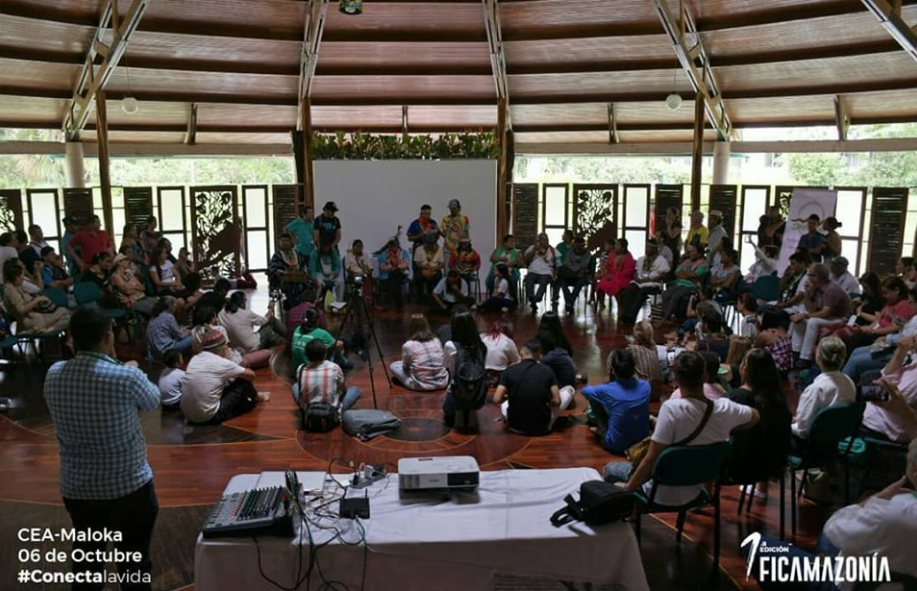Indigenous communities in Colombia are mobilizing to protect the Amazon rainforest from fracking.
Contagio Radio reports, “Grandparents and grandmothers from seven Indigenous communities of Putumayo, Caquetá, Amazonas, Boyacá and Venezuela met to discuss the importance of preserving the largest tropical forest on the planet.”
Putumayo and Caquetá are departments in southern Colombia mostly covered by tropical rainforest that is part of the Amazon rainforest. Amazonas is also a department in southern Colombia that derives its name from the Amazon River.
Putumayo and Caquetá are close to the Colombian border with Ecuador and Peru, while Amazonas borders Peru and Brazil.
The Boyacá department is in eastern Colombia and borders Venezuela.
Semana Sostenible reports that members of the Siona, Cofan, Kamentsa and Inga communities from the departments of Putumayo, Caquetá and Amazonas, as well as the U’wa, of Boyacá, and Huottojas of Venezuela were present.
The Contagio Radio article highlights, “The meeting of ancestral wisdom [in Putumayo was] very significant since the Councils of the Elderly of the Indigenous Peoples of Latin America had not been carried out for more than 50 years.”
The article refers to their “manifesto for the Amazon” which includes a call for the “cancellation of licences for the exploration and exploitation of the natural resources of Mother Earth,” notably an end to “mining-energy concessions,” the protection of forests, and “not to implement fracking” as is planned in the coming months.
Contagio Radio adds, “They also reiterated the importance of not pursuing or stigmatizing their social leaders.”
In the article “2018 was the deadliest year in decades for Indigenous leaders in Colombia,” Hanna Wallis comments: “Indigenous communities in Colombia are continuing to suffer an accelerating wave of violence as murders against social leaders carry on unchecked.”
And El Espectador published this commentary by Armando Valbuena that notes:
“From November 2016 to June 2019, 1,029 leaders of the Indigenous peoples have been threatened, 330 have been killed and 166 have suffered attacks by armed actors such as the Black Eagles, dissidents of the FARC and the ELN.”
That article by Valbuena, the former president of the National Indigenous Organization of Colombia (ONIC), concludes, “The current situation comes from the folly to exploit the land and the use of violence as a framework that allows it.”
ONIC is similarly opposed to fracking in Colombia, notably in the north-central Middle Magdalena region that includes the city of Barrancabermeja.
Valora has reported that regulations on fracking will be ready by the end of this year and Ecopetrol says it will be ready to start fracking pilot projects in the second half of 2020.
But Caracol Radio now reports Juan Pablo Ruiz , a member of the Commission of Experts for Fracking, saying that baseline conditions must be met and that in order to meet these conditions it will take at least one year.
It has not yet been specified where the pilot projects will take place.
Furthermore, the Luis Carlos Perez Lawyers’ Collective (CCALCP) has long sought the implementation of Judgment T-880/2006 of the Constitutional Court of Colombia that relates to “the right to free prior and informed consent, and the rights related to demarcation of land, as well as exploitation of natural resources.”
An article in Petroleum Economist this past July titled “Colombian fracking edges closer to reality” concludes with the sentence, “Unconventional assets are also often near indigenous lands, which could pose further headaches.”
For information on the Peace Brigades International-Canada organized speaking tour in Canada featuring Colombian human rights defenders from CCALCP and CREDHOS speaking on fracking, Indigenous rights and climate breakdown, please click here.
Brent Patterson is a political activist, writer and the executive director of PBI-Canada. This article originally appeared on the PBI-Canada website.
Image: Ficamazonia/Facebook



